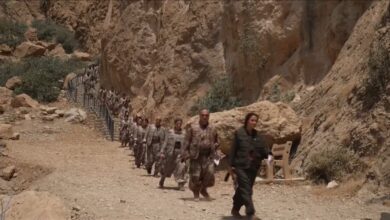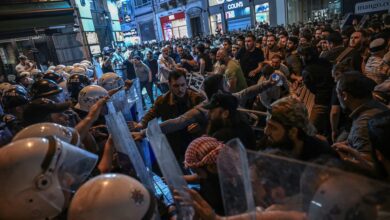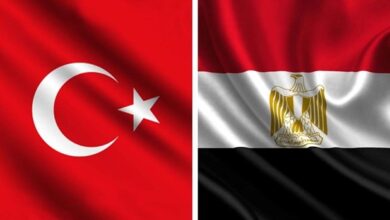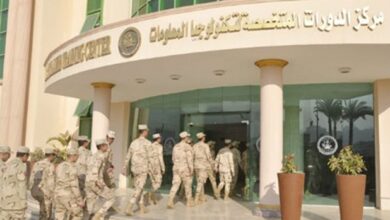Since the early days of the Egyptian revolution, the deployment of military forces, first to maintain public order and then to run the country following former President Hosni Mubarak’s resignation, has triggered questions over the future of civilian-military relations in a potentially democratic system. In this context, a debate over whether Egypt can import the Turkish model has recently come to the fore.
“We’re mistaken if we believe that the military institution will withdraw entirely from Egyptian politics,” says Amr Hamzawy, an Egyptian expert with the Carnegie Endowment for International Peace.
Reproduction of the Turkish military-civilian relationship is conceivable in Egypt, he adds.
In Turkey’s parliamentary system, both the presidency and the premiership are held by elected civilians. Yet, its army remains in charge of protecting democracy, secularism, human rights and loyalty to Turkish nationalism as laid out by its constitution. After decades of tensions following President Mustafa Kemal Atatürk’s formation of the Turkish republic in 1923, the military forced Islamists to make major ideological concessions that resulted in the establishment of the ruling Justice and Development party in 2001. The party was hailed internationally as a successful example of moderate Islamic politics.
“In Egypt, the military can remain in charge of safeguarding the civil nature of
The army does not have to intervene directly in politics in order to deter any political force from threatening the democratic nature of
In possible indication that Egypt’s army intends to play a similar role, it recently affirmed its commitment to establishing of a democratic civil order in Egypt. It promised that it would withdraw from politics by the end of the six-month transitional period after transferring power to a democratically-elected civilian government.
The Supreme Council of Armed Forces denied any interest in controlling the presidency. Such a statement–if representative of the army’s true intentions–could signal a break from the legacy of the Egyptian Revolution of 1952 that brought to power four military presidents: Mohamed Naguib, Gamal Abdel Nasser, Anwar Sadat and Hosni Mubarak.
Amr al-Shobaki, political analyst with Al-Ahram Center for Political and Strategic Studies, believes that the success of the Turkish model in Egypt remains contingent on the political shrewdness of civilian political elite.
“We can reproduce [the Turkish model] as long as the civilian political elite is capable of offering a success story,” says al-Shobaki. “The progress that took place in Turkey had to do with the ability of the political civilian elite to transcend conventional dichotomies of secular versus religious. The Justice and Development Party succeeded in breaking this polarization and in establishing a democratic coalition.”
By presenting the Justice and Development Party as a democratic–rather than Islamic–political force since its founding in 2001, its savvy leaders–former Islamists–succeeded in curtailing the military’s role in civilian politics.
“If the civilian political elite fails to administer the political process in Egypt, the military will assume a role similar to the one played by the Turkish army before 1997,” adds al-Shobaki. In 1997, Turkey’s army forced Islamist Prime Minister Necmettin Erbakan to resign. Erbekan had antagonized the Turkey’s devoutly secular army by seeking to restore Islam to Turkish society and politics.
Before 1997, the Turkish Armed Forces toppled three elected governments in military coups in 1960, 1971, and 1980 in order to squelch political turmoil or crush Islamists.
The Muslim Brotherhood stands out as the largest and most organized civilian political force in Egypt today. While the group periodically reiterates its commitment to civil society, its position on democracy remains ambivalent. In 2007, the group issued a political platform that envisaged an Islamic democracy where a council of religious scholars would be in charge of reviewing legislation and ensuring that it does not contradict Islamic Shariah law. In the meantime, the group still opposes women and religious minorities becoming president. It remains to be seen whether a process of political liberalization would change the group’s vision.
Other analysts remain weary of following the Turkish model by assigning the military a guardianship rule over elected governments.
“I do not want the military to play this role,” says Mostafa Kamel al-Sayyed, a political science professor at Cairo University. “The responsibilities in this realm are quite vague. What does protecting democracy mean?”
The military can use safeguarding missions as a pretext to oust governments it dislikes, explains al-Sayyed.
“This [defending democracy] should be left to civilian institutions like the judiciary,” adds al-Sayyed. “The army should be limited to its professional role to defend independence and security.”
In the meantime, al-Sayyed rules out the possibility that the Egyptian armed forces is interested in adopting the Turkish example.
“I do not see the military allowing itself to become a guardian of the constitutional order unless political stability is seriously threatened,” says al-Sayyed.
On 28 January, Mubarak deployed the army to maintain public order and replace police forces, which withdrew after a fierce battle with anti-Mubarak protesters.
“The military did not take the initiative of interfering; they were called upon by the president and they emerged reluctantly,” adds al-Sayyed. “They are determined to return to the barracks.”
“[But], the army will continue to be interested in issues related to national security,” he continues.
Foremost among the foreign policy dossiers that the military is expected to control is the Egyptian-Israeli peace accord. Egypt’s yearly US$1.2 billion in military aid from the United States is conditional on Egypt honoring the treaty. Earlier this month, the Supreme Council for Armed Forces reiterated Egypt’s commitment to foreign agreements.
Some argue that before 28 January, Egypt’s army was depoliticized. Mubarak’s predecessor, Anwar Sadar, sought to demilitarize Egyptian politics, especially after concluding peace with Israel in 1979. He reduced the number of senior and retired officers in his cabinets and senior government positions, sacked commanders who opposed his policies, and decreased the military budget.
Upon coming to power in 1981, Mubarak charmed the military with economic privileges. Eventually, the army became involved in development projects, commanding an empire of that continues to produce civilian goods and services. As it increasingly concentrated on business, the army’s role in domestic politics gradually declined.
While Mubarak’s resignation compelled the army to re-emerge as the dominant player in Egyptian politics, its true intentions and limits of its power, remain to be seen.




